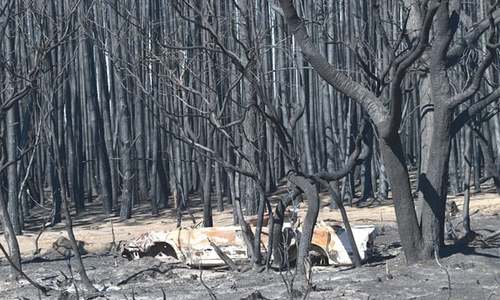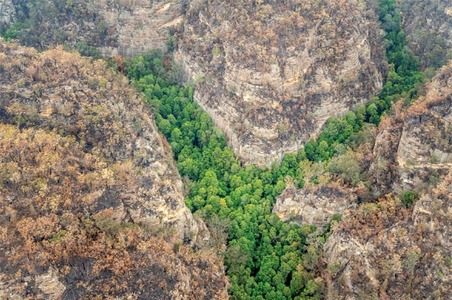SINGAPORE: Australian animals living in specific habitats, such as mountain lizards, leaf-tailed geckos and pear-shaped frogs, are battling the threat of extinction after fierce bushfires razed large areas of their homes, a new analysis shows.
Fire has destroyed more than two-thirds of a northeastern zone sprawling over 12 sq km (5 sq miles) where a type of lizard, the Mount Surprise Litter-skink, lives, the analysis of known habitats and satellite-detected fire activity shows.
“The Mount Surprise Litter-skink is one of a number of species that has very limited distribution. That can mean there’s a huge risk of extinction,” said conservation biologist David Lindenmayer.
“When species distributions are so limited, there’s a really high risk that just a single event could knock them down,” added Lindenmayer, an academic at Australian National University.
The huge wildfires have razed more than 11.2 million hectares (27.7 million acres), an area equivalent to half the United Kingdom, and killed 29 people since flaring last year in the southern hemisphere spring.
Officials estimate the fires have ravaged more than 80 per cent of the unique ecosystems of at least 49 animal and plant species already listed as ‘threatened’.
Analysis shows species at risk also include the Kate’s leaf-tailed gecko and the tiny Pugh’s frog, after fires ravaged more than half of their home areas.
The government has called the blazes an ecological disaster, and up to a billion animals, including livestock and domestic pets, are estimated either to have died in them or be at risk after the destruction of food sources and shelter.
Even species with much larger habitat ranges, such as the rarely-seen eastern ground parrot, face challenges as the ground-dwelling bird lives in coastal and sub-coastal shrubland that is prone to catching fire, environmental officials say.
Even many animals that survive the fires, such as the long-footed potoroo, a rat-kangaroo that lives in southeastern forests, will face threats, said Brendan Wintle, a specialist in conservation ecology at the University of Melbourne.
“They are now also very threatened because of wild foxes, cats and wild dogs,” he said. “These predators are very good at targeting areas that have been burnt or near burnt and they know the animals have left their shelter.” While bushfires are common in Australia, authorities say the current scale of destruction is unprecedented, fuelled by a prolonged drought and record high temperatures that have left eastern regions tinder-dry.
The island continent is home to some of the world’s most interesting and diverse animals, such as the platypus and koala, which have been devastated by fires.
An estimated 30 percent of koala habitat, comprised of eucalypt woodlands, which the animals use both for food and shelter, may have been lost in the state of New South Wales, said Sally Box, the commissioner for threatened species.
The koalas’ heavy fur and tendency to climb higher when threatened are severe disadvantages in fast-moving bushfires.
This news agency calculates that more than 47,000 sq km (18,147 sq miles) of koala habitat has been affected by fire.
Published in Dawn, January 22nd, 2020
















































Dear visitor, the comments section is undergoing an overhaul and will return soon.